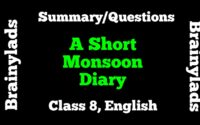Glimpses of the Past Class 8 Summary & Notes – CBSE English NCERT
Glimpses of the Past Class 8 Summary Notes Questions Answers
Summary of Glimpses of the Past
Glimpses of the Past Class 8 : This chapter talks about what happened in 1757. The British had better quality guns and they were also financially sound. On the other hand, the Prince of Indian states were not as good as the British. They fought with each other for no reason and some even asked for help from the British to solve their conflict with other kingdoms. Meanwhile, the East India Company took advantage of this situation because it knew that they could win. Some people were in favor of the British, but there were a lot more who did not like them. Tipu Sultan from Mysore was a good ruler who fought the British and died while fighting against them.
As we progress in the chapter, we learn about bad practices that were preached by the religious and orthodox leaders. The Indians lost their self-esteem and the British scorned them. They imposed heavy taxes on local farmers and forced them to abandon their fields. They also chopped the thumbs of skilled artists. The British manufactured goods in England, but then they had to pay import taxes when they imported anything into India. This meant that their main motive was to maximize profit while minimizing costs for themselves through unfair practices.
Raja Ram Mohan Roy was a man from Bengal. He started things to change India in the 1800s. He started the Brahmo Samaj which is about religion, and he said that all religions are the same (they teach similar principles). He also wanted people to get better at science and modern knowledge. Then he created newspapers, but they were stopped by the British in 1823 because of British rules. But Raja Ram Mohan Roy did not give up! He fought for people’s rights like child marriage, polygamy, and caste divisions in society – like Sati (burning someone alive after they die). And finally Raja Ram Mohan Roy did it! All these practices are now gone!
The British continued to be mean to the people they were taking over. They passed a law that said an Indian could be put in jail without trial. The Indians’ businesses became worse because the British exported things and ruined their industries. The British treated them as if they were not as important and made them do things like learn English. Incidentally, the education policy also helped to produce a new generation of intellectuals who could understand the social vices of British rule. They would educate their friends about these vices.
The British conquered almost the entire country. The British were very hard on the native people. This led to revolts in 1855 and 1857. In 1855, the Santhals rose up to rebel against their rulers and killed them. In 1857, there was a rebellion among the Sepoys (Indian soldiers). They attacked their officers, who were mainly British; many of them were killed because they had insulted an Indian soldier named Mangal Pandey. He was also executed for his actions after he attacked an adjutant (a high-ranking officer). Soon other groups joined with him to overthrow the government and its supporters by force. People started to circulate chapatis. This was to tell people that the ruler needed their help. They also circulated lotus flowers among the Indian soldiers to tell them that they needed their help.
Several rulers joined the fight for freedom. Begum Hazrat Mahal of Lucknow, Maulvi Ahmedulla of Faizabad, Azimulla Khan, Tatya Tope, Peshwa Nana Saheb of the Maratha dynasty and Kunwar Singh fought to make India independent.
RELATED
|
|
NCERT Solutions of Glimpses of the Past Class 8
Comprehension Check (Page 45)
Question 1: Look at Picture 1 and recall the opening lines of the original song in Hindi. Who is the singer? Who else do you see in this picture?
Answer: The opening lines of the original song in Hindi are –
“Aye mere watan ke logon, tum khub laga lo naara
yeh shubh din hai ham sab ka, lehralo tiranga pyaara
par mat bhulo seema par, veeron ne hai praan ganvaaye
kuchh yaad unhe bhee kar lo – (2)
jo laut ke ghar naa aaye – (2)
That song was was sung by Lata Mangeshkar.
In this picture, we get to see impeccable leaders of India Such as; Lal Bahadur Shastri, Pandit Jawaharlal Nehru, Indira Gandhi, Rani Laxmibai of Jhansi, Bal Gangadhar Tilak, Bahadur Shah Zafar, Lala Lajpat Rai, Bhagat Singh, Mahatma Gandhi and Netaji Subhash Chandra Bose.
Question 2: In Picture 2 what do you understand by the Company’s “superior weapons”?
Answer: The East India Company’s “superior weapons” refer to guns and cannons, with strong rules and regulations and diplomacy of the British rulers.
Question 3: Who is an artisan? Why do you think the artisans suffered? (Picture 3)
Answer: An artisan is someone who makes things by hand. They are skilled in their craft. The British took money from the artisans because they were not making enough profit on their products, but also because the British were importing machine-made goods from England and selling them on a large scale. This ruined the market for hand-made items made by artisans.
Question 4: Which picture, according to you, reveals the first sparks of the fire of revolt?
Answer: Picture 7, The Sparks (1855-57) reveals the first sparks of the fire of revolt.
Working with the text (Page 45)
Question 1: Do you think the Indian princes were short-sighted in their approach to the events of 1757?
Answer: Yes, the Indian princes were short-sighted when they helped the British rulers. They did not understand that the British wanted to capture all of India. The British started out by being helpers who would help an Indian prince win a battle against another prince. But they soon became rulers themselves and they won battles on their own so that they could take over more land in India.
Question 2: How did the East India Company subdue the Indian princes?
Answer: The East India Company traded in machine-manufactured items from England. Their competition was the Indian princes who were always fighting with each other. They asked the English merchants for help in fighting their counterparts. This made it hard for people to be safe because of all the fighting going on. The East India Company took advantage of this and slowly gained control over the Indian princes one by one.
Question 3: Quote the words used by Ram Mohan Roy to say that every religion teaches the same principles.
Answer: Ram Mohan Roy quoted that “Cows are of different colours, but the colour of their milk is the same. Different teachers have different opinions but the essence of every religion is the same.”
Question 4: In what ways did the British officers exploit Indians?
Answer: The British did many bad things to the Indians. They increased taxes for the peasants, lowered import taxes on English goods and imported those to India, and cut off artisans’ thumbs so they couldn’t work.
Question 5: Name these people.
(i) The ruler who fought pitched battles against the British and died fighting.
(ii) The person who wanted to reform the society.
(iii) The person who recommended the introduction of English education in India.
(iv) Two popular leaders who led the revolt (Choices may vary.)
Answer:
- Tipu Sultan of Mysore fought pitched battles against the British and died fighting.
- Raja Ram Mohan Roy was the person who wanted to reform the society.
- Macaulay recommended the introduction of English education in India.
- Two popular leaders who led the revolt were Maulvi Ahmedulla of Faizabad and Peshwa Nana Saheb.
Question 6: Mention the following.
(i) Two examples of social practices prevailing then.
(ii) Two oppressive policies of the British.
(iii) Two ways in which common people suffered.
(iv) Four reasons for the discontent that led to the 1857 War of Independence.
Answer:
- Child marriage and untouchability.
- Firstly, the British did not make the Indians pay for anything they made in England. Secondly, the British made some Indians go to jail without trial.
- The British made the farmers pay a lot of money and they cut off the thumbs of the artisans so that they could not do their work.
- Given below are the reasons that led to the 1857 War of Independence:
- In Bengal, the Santhals lost their land under British land rules. This made them very angry and they tried to rebel. But Europeans came in 1855 and made them stop doing it. Europeans were massacred.
- The Indian sepoys of the British army were angry because they did not get anything like what the white soldiers got. The white soldiers lived in big houses and had servants.
- The soldiers were angry when they learned that the grease on the bullets they were biting was made from cows and pigs.
- Many landlords were upset because they lost their land and estates due to the harsh British policies.
Working with language (Page 46)
Question 1: Change the following sentences into indirect speech.
(i) First man: We must educate our brothers.
Second man: And try to improve their material conditions.
Third man: For that we must convey our grievances to the British Parliament.
a) The first man said that ______________________________________________
___________________________________________________________________
b) The second man added that _______________________________________
___________________________________________________________________
c) The third man suggested that ________________________________________
___________________________________________________________________
(ii) First soldier: The white soldier gets huge pay, mansions and servants.
Second soldier: We get a pittance and slow promotions.
Third soldier: Who are the British to abolish our customs?
a) The first soldier said that ___________________________________________
___________________________________________________________________
b) The second soldier remarked that __________________________________
__________________________________________________________________
c) The third soldier asked __________________________________________
_________________________________________________________________
Answer:
(i)
(a) The first man said that they must educate their brothers.
(b) The second man added that they must try to improve their material conditions.
(c) The third man suggested that they must convey their grievances to the British Parliament.
(ii)
(a) The first soldier said that the white soldier got huge pay, mansions and servants.
(b) The second soldier remarked that they got a pittance and slow promotions.
(c) The third soldier asked who the British were to abolish their customs.
Do share this post if you liked Glimpses of the Past Class 8 notes. For more updates, keep logging on BrainyLads


